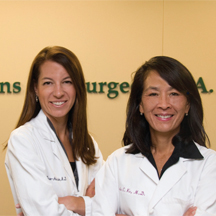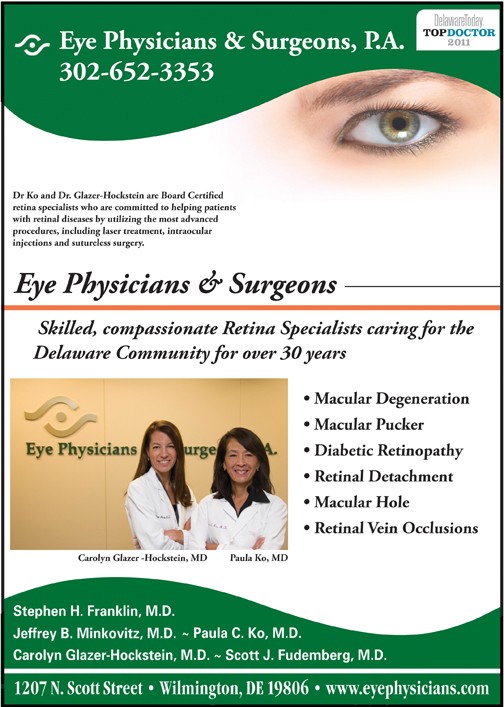Vitamins And AMD • Age-Related Eye Disease Study 2 • (AREDS2) Results
By Paula C. Ko, MD
Age-Related Macular Degeneration is the leading cause of blindness in the United States in patients over 60 years of age. There are so many people over age 60 that it is the leading cause of blindness in the United States overall. The original AREDS study (Age-Related Eye Disease Study) was first published in 2001. It was sponsored by the NIH (National Institutes of Health) and showed that the following vitamins were beneficial to the treatment of moderate to severe age-related macular degeneration.
The original AREDS formulation included
- Vitamin A 15 mg (Beta Carotene)
- Vitamin C 500mg
- Vitamin E 400 IU
- Zinc 80mg
- Cupric Oxide 2mg
When taken together these vitamins decreased the progression to advanced AMD from moderate to severe AMD by 25%. The long-term positive affects have lasted up to 5 years and were most notable in patients with the wet form of macular degeneration. Because of this study, ophthalmologists recommend that patients who have moderate to severe AMD take AREDS vitamins whether or not they have the wet or the dry form.
Despite this, there have been other vitamin-based studies that make it difficult to recommend these high-dose vitamins in some patients. For example, it has been noted that the risk of lung cancer is increased in smokers who take high doses of vitamin A. Because of this we do not recommend that smokers take the AREDS vitamins. Patients that have AMD are counseled to stop smoking to decrease the risk of progression of AMD. Even if patients stop, they should not take high doses of vitamin A as the risk of lung cancer still remains high even after quitting smoking. We also do not recommend high doses of zinc to men who have problems with Benign Prostatic Enlargement (BPH) as zinc can compound this problem. Lastly, it has been shown that vitamin A may be problematic in patients with osteoporosis, decreasing bone density and increasing the risk of fracture.
With all these other studies in mind, we as ophthalmologists must consider many other factors when recommending the AREDS vitamin to patients with moderate to severe AMD. Patients with AMD not uncommonly have other medical issues as these other diseases are also commonly found in patients over the age of 60. When recommending vitamins to a patient, all medical issues must be taken into consideration.
The AREDS2 study was designed to test whether adding lutein (10mg), zeaxanthin (2mg), and omega-3 fatty acids (1gm) with or without the AREDS original formulation would be of additional benefit in reducing the development of advanced AMD. It was thought that perhaps the AREDS2 formula could have more affect as well as be a safer vitamin. Lutein and Zeaxanthin are pigment found in the macula. The macula is part of the retina that allows people to recognize people’s faces, drive and read, in another words, it is the part of the retina that allows for central vision. It was felt that Lutein and zeaxanthin were a safer substitute for vitamin A. Because of the risk of vitamin A and lung cancer in smokers, vitamin A was eliminated from the AREDS2 formula. The dosage of zinc was also reduced because the side affects on BPH as well as the fact that such a high dose of zinc may not be absorbed fully.
The findings of the AREDS2 Study were recently published this year and showed the new formulation will also decrease the rate of progression to advanced AMD by 18% and wet AMD by 22%. It did not help the dry form of AMD called geographic atrophy. This new formula does not work any better than the original AREDS formula but it is felt to be a safer supplement. The positive affects of taking omega-3 fatty acid (fish oil) was not recognized in the study. It is still recommended that patients eat fish 2-3 times a week. Fish is beneficial not only for the eyes but for the heart. In addition, a diet rich in green leafy vegetables also can be beneficial in treating AMD. These diet recommendations are highly recommended. It should be noted that taking vitamin supplements do not substitute for a healthy diet.
Listed below is the new AREDS2 Formulation – these are safer
vitamins that work as well as the AREDS formula.
- lutein (10mg)
- zeaxanthin (2mg)
- Vitamin C 500mg
- Vitamin E 400 IU
- Zinc 25 mg
- Cupric Oxide 2mg
In summary, AMD is the leading cause of blindness in the United States in people over the age of 60. Eating green leafy vegetables daily, fish 2-3 times a week, maintaining good blood pressure and cholesterol as well protecting the eyes from UV light may be of benefit in decreasing the risk of AMD progression. In addition, taking a supplement with this new formulation of AREDS2 may decrease the progression to severe AMD as well as be a safer supplement.
Paula C. Ko, MD is with Eye Physicians & Surgeons, P.A., 1207 North Scott Street, Wilmington, DE 19806. Dr. Ko graduated with honors from the Ohio State University College of Engineering in 1984. Dr. Ko received her M.D. degree from the Ohio State University College of Medicine in 1989, again with honors. Following her residency in Ophthalmology at Temple, Dr. Ko served a prestigious fellowship at Georgetown University in diseases of the retina and vitreous, and is Certified by the American Board of Ophthalmology.
Dr. Ko has an area of special expertise in retinal problems, especially diabetic eye disease, macular degeneration, retinal detachment, and laser and intraocular injections. Dr. Ko has lectured extensively, and has published many papers on these topics.
Dr. Ko is active in resident training, and is on staff at the University of MD and Temple University, as well as at the Medical Center of DE. Dr. Ko is at the forefront of ophthalmic technology, and utilizes the most advanced procedures, including laser treatment and intraocular injections, in the care of her patients.
Dr. Carolyn Glazer-Hockstein and Dr. Paula Ko are retina specialists at Eye Physicians and Surgeons who are committed to helping patients with AMD and other retinal diseases. If you would like to learn more about AMD or to
schedule an appointment call (302) 652-3353.
1207 North Scott Street, Wilmington, DE 19806



